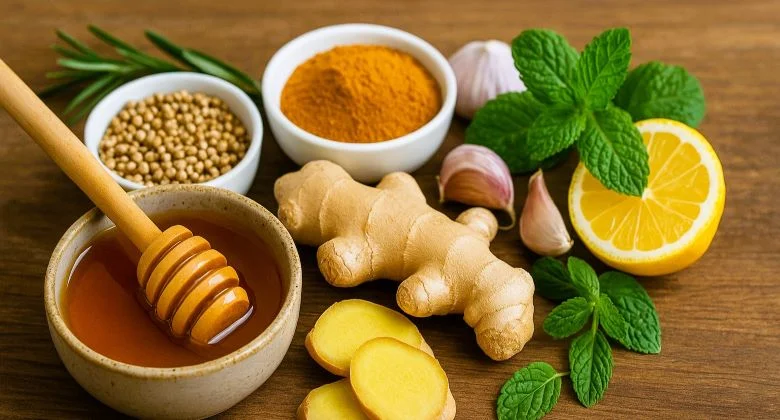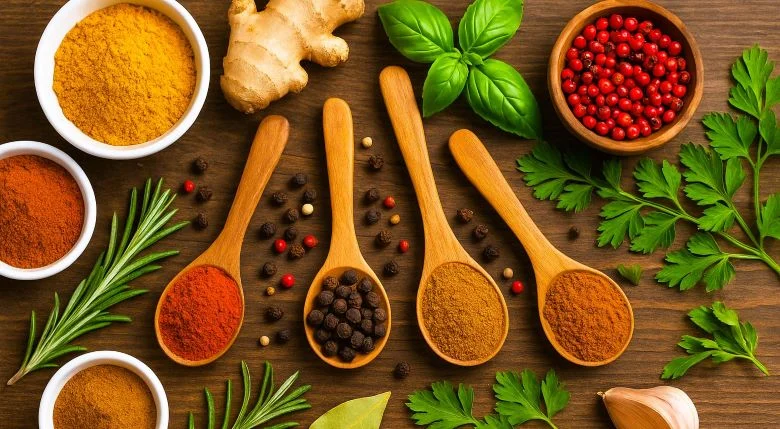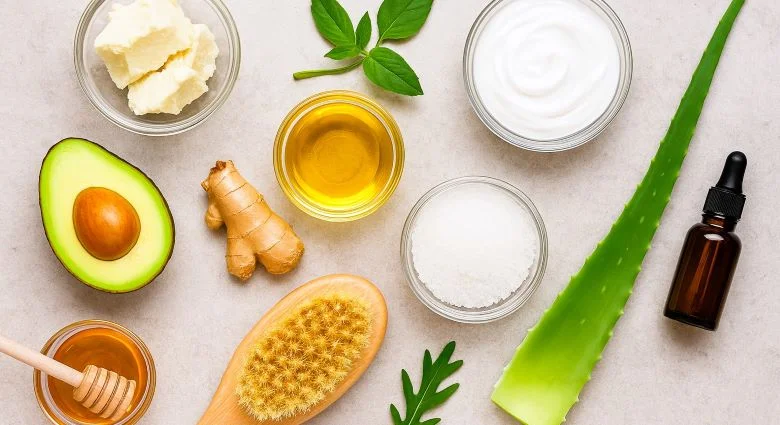
When it comes to your health, you don’t always need a trip to the pharmacy.
Some of the best remedies may already be sitting in your kitchen cabinet. With rising healthcare costs, more people are turning to natural, affordable solutions for everyday ailments. DIY health isn’t just a trend—it’s a smart way to save money while caring for your body and mind.
The Healing Power of the Kitchen: Unlock Natural Remedies
You don’t need to be a herbalist to tap into the healing powers of your pantry. Many common kitchen ingredients have powerful medicinal properties backed by science and centuries of use.
Everyday Remedies from Your Kitchen
- Honey: Great for sore throats and coughs. Its antibacterial properties can soothe irritated tissue.
- Ginger: A natural remedy for nausea and inflammation. Use in tea or chew raw slices.
- Garlic: Supports immune health and fights infections. Crushed raw garlic has allicin, a natural antibiotic.
- Apple cider vinegar: May help with digestion, blood sugar regulation, and skin health.
These ingredients are cheap, accessible, and effective when used correctly.
Backed by Science and Tradition
Scientific studies support what many cultures have known for centuries: nature works.
For example, ginger has been shown to reduce muscle pain, and garlic may reduce blood pressure. Ayurveda, Traditional Chinese Medicine, and Indigenous practices all highlight natural healing using herbs and foods.
Safety First: Use with Caution
- Always start with small doses.
- Check for allergies.
- Avoid using remedies that interact with medications.
- Consult your doctor if you’re pregnant, nursing, or managing chronic conditions.
Spices and Herbs: Nature’s Affordable Pharmacy

Herbs and spices aren’t just for flavor—they’re packed with health benefits.
Powerful Spices You Already Own
- Turmeric: Contains curcumin, a powerful anti-inflammatory.
- Cinnamon: Balances blood sugar and adds warmth to digestion.
- Peppermint: Relieves headaches and aids digestion.
- Thyme: Fights bacteria and boosts respiratory health.
These simple seasonings can help prevent illness, support immunity, and reduce inflammation—all without a prescription.
Expert Insight: Why They Work
Research shows many spices are rich in antioxidants and phytochemicals that help combat disease.
For instance, turmeric’s curcumin rivals over-the-counter pain relievers in some studies without the harsh side effects.
DIY Recipes and Kits
Try making:
- Golden milk with turmeric, milk, black pepper, and honey.
- A homemade herbal steam with thyme and eucalyptus for congestion.
- An immune-boosting tea with ginger, cinnamon, and lemon.
Create a spice-health kit using mason jars, labels, and a few core herbs.
Grow Your Own Medicine
You don’t need a garden. Use windowsill planters or mason jars for herbs like basil, mint, rosemary, and parsley. Dry or freeze excess herbs to use year-round.
Use with Care
Natural doesn’t always mean safe. Some herbs can interfere with medications or worsen existing health conditions. Always research or consult a professional before starting new herbs.
DIY Skin and Body Care: Natural Beauty from Head to Toe

Ditch the expensive, chemical-laden beauty products. You can make effective, gentle alternatives at home.
Skincare from the Pantry
- Oatmeal masks for dry, irritated skin.
- Honey and cinnamon spot treatments for acne.
- Coconut oil and sugar scrubs for exfoliation.
- Aloe vera gel for sunburn and inflammation.
These remedies are often more affordable and gentler on the skin.
Know Your Skin Type
Choose remedies based on your needs:
- Oily skin? Go light with tea tree oil.
- Dry skin? Use avocado or shea butter.
- Sensitive skin? Stick to soothing options like chamomile or aloe.
Safe, Simple, and Sustainable
Making your own skincare means:
- No mystery chemicals.
- Less plastic waste.
- Fewer trips to the store.
It’s eco-friendly and wallet-friendly.
Real Results from Real People
Many people swear by these remedies after ditching store-bought products. Try a small patch test before full use and keep your creations stored in clean, sealed containers.
Caring for Mental Well-being: Stress Relief at No Cost

Your mental health matters as much as your physical well-being. And you don’t need to spend a lot to care for your mind.
DIY Mental Health Boosters
- Aromatherapy: Use essential oils like lavender or eucalyptus in a diffuser or homemade spray.
- Meditation: Free apps or YouTube videos can guide you through calming routines.
- Breathing exercises: Just 5 minutes a day can lower anxiety and improve focus.
Science-Backed Benefits
Studies show that self-care routines, mindfulness, and aromatherapy can lower cortisol levels (your stress hormone) and improve mood.
Create a Calm Space
Use candles, soft lighting, calming music, and scents to create a sanctuary. Even a small corner of your home can become a peaceful retreat.
Know Your Stress Triggers
Reflect daily on what’s causing stress. Journaling or talking to a friend can help you identify patterns and manage them proactively.
Gratitude and Reflection
Daily gratitude journaling has been linked to improved sleep, mood, and overall happiness. Try listing three things you’re thankful for every night before bed.
Key Takeaways
- Many kitchen staples double as powerful natural remedies.
- Herbs and spices can help with inflammation, immunity, and overall health.
- Homemade skincare is gentle, effective, and budget-friendly.
- Mental wellness can be supported with simple, free routines at home.
- Always research remedies and consult a healthcare provider when in doubt.
FAQs
Q: Are DIY remedies safe for kids?
A: Some are, but always consult a pediatrician first. Natural doesn’t always mean safe for children.
Q: How long do homemade remedies last?
A: Most should be used within a week unless preserved (e.g., oils, dried herbs). Store in clean containers in the fridge if needed.
Q: Can I use essential oils directly on skin?
A: Not usually. Most should be diluted with a carrier oil to prevent irritation.
Q: Do these remedies replace medicine?
A: No. They can support health but shouldn’t replace prescribed treatments unless your doctor approves.
Q: Where can I buy high-quality herbs and oils?
A: Health food stores, online retailers, or local farmers markets often carry quality options. Look for organic and reputable brands.
Conclusion: Heal Naturally, Spend Less
DIY health isn’t about going rogue—it’s about empowering yourself with knowledge and affordable tools. From spices that reduce inflammation to homemade skincare and mental wellness practices, nature offers everything you need to thrive.
Start small. Try one new remedy this week. Your body—and your budget—will thank you.
👉 Ready to embrace DIY health?
Start by creating a basic home remedy kit. Grab your favorite herbs, essential oils, and a few mason jars. You’ll be amazed at what you can do with just a few ingredients and a little know-how.
Follow us at StayHealthyGetWealthy.com for more tips on saving money while living your healthiest life.
📝 Get Your Free DIY Starter Kit Checklist!
Ready to build your own natural health kit with ingredients you already have at home?
Download the FREE “DIY Home Remedy Starter Kit Checklist” and start saving money while boosting your health naturally.

Alice, it’s amazing how many powerful remedies are hiding in our kitchens!
Who knew that a simple ingredient like ginger could be a natural remedy for nausea and inflammation, or that garlic supports immune health and fights infections?
It makes you think about how much we rely on pharmacies when nature offers so much.
What’s one kitchen staple you’ve used for a home remedy, and what was your experience?
Eric
Hi Eric, you’re absolutely right! It really is amazing how much healing power is sitting right there in our kitchens. 🏡🌿
One of my go-to remedies is honey, especially raw or wild honey. It’s been a lifesaver for soothing sore throats and calming coughs in our family. Plus, it’s great for minor burns and wounds — my mom used to apply it on small cuts when I was a kid, and it worked wonders.
I agree with you — it really does make us rethink how often we rush to the pharmacy when nature has already provided so much.
Do you have a favorite remedy that you always swear by? I’d love to hear it!
Hey, this article is pretty cool! I love how it shows simple things we all have at home that can actually help with health stuff and save money.
Have you tried any of these remedies yourself?
I’ve used ginger tea to calm upset stomachs and honey for sore throats — works like a charm! One thing I wonder though: are there any herbs we should be careful with, especially if someone’s on meds or pregnant?
Also, growing herbs indoors sounds fun but tricky. Anyone got tips for small spaces? Overall, natural remedies are awesome but it’s probably smart to double-check with a doc before trying something new.
What do you guys think?
Hi Elena!
Thanks so much for your thoughtful comment—I’m glad you enjoyed the article! Yes, I definitely use some of these remedies myself. My personal favorite is a warm tea with lemon—so soothing and refreshing, especially when I’m feeling run down.
You’re absolutely right to bring up precautions—certain herbs like licorice root or St. John’s Wort, for example, can interact with medications or may not be safe during pregnancy. It’s always wise to consult with a healthcare provider before trying a new remedy, especially if someone has health conditions or is taking prescriptions.
And growing herbs indoors? Totally doable, even in small spaces! Window sills, hanging planters, or even a little vertical garden can work wonders. Basil, mint, and chives are great starter herbs that don’t take up much room.
Thanks again for sharing your experience—ginger tea and honey are classics for a reason!